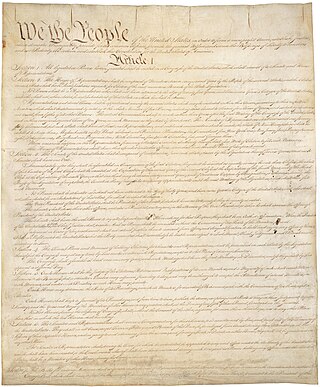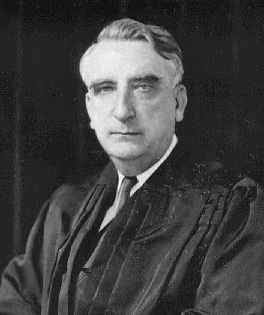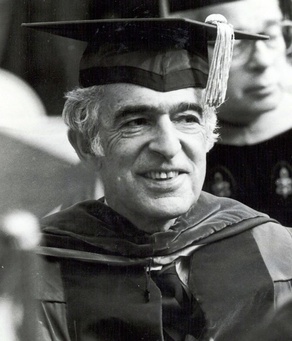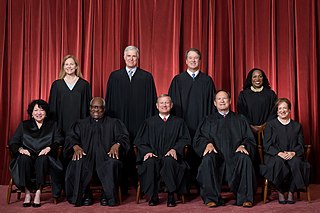
The Constitution of the United States is the supreme law of the United States. It superseded the Articles of Confederation, the nation's first constitution, on March 4, 1789. Originally including seven articles, the Constitution delineates the frame of the federal government. The Constitution's first three articles embody the doctrine of the separation of powers, in which the federal government is divided into three branches: the legislative, consisting of the bicameral Congress ; the executive, consisting of the president and subordinate officers ; and the judicial, consisting of the Supreme Court and other federal courts. Article IV, Article V, and Article VI embody concepts of federalism, describing the rights and responsibilities of state governments, the states in relationship to the federal government, and the shared process of constitutional amendment. Article VII establishes the procedure subsequently used by the 13 states to ratify it. The Constitution of the United States is the oldest and longest-standing written and codified national constitution in force in the world.

The University of Chicago Law School is the law school of the University of Chicago, a private research university in Chicago, Illinois. It employs more than 180 full-time and part-time faculty and hosts more than 600 students in its Juris Doctor program, while also offering the Master of Laws, Master of Studies in Law and Doctor of Juridical Science degrees in law.

Frederick "Fred" Moore Vinson was an American attorney and politician who served as the 13th chief justice of the United States from 1946 until his death in 1953. Vinson was one of the few Americans to have served in all three branches of the U.S. government. Before becoming chief justice, Vinson served as a U.S. Representative from Kentucky from 1924 to 1928 and 1930 to 1938, as a federal appellate judge on the U.S. Court of Appeals for the District of Columbia Circuit from 1938 to 1943, and as the U.S. Secretary of the Treasury from 1945 to 1946.
Peter H. Irons is an American political activist, civil rights attorney, legal scholar, and professor emeritus of political science. He has written many books on the U.S. Supreme Court and constitutional litigation.

The Judicial Procedures Reform Bill of 1937, frequently called the "court-packing plan", was a legislative initiative proposed by U.S. President Franklin D. Roosevelt to add more justices to the U.S. Supreme Court in order to obtain favorable rulings regarding New Deal legislation that the Court had ruled unconstitutional. The central provision of the bill would have granted the president power to appoint an additional justice to the U.S. Supreme Court, up to a maximum of six, for every member of the court over the age of 70 years.

Ronald Kenneth Leo Collins is the co-founder and co-director (emeritus) of the History Book Festival and co-founder and co-chair of the First Amendment Salons. He is the editor of the weekly online blog First Amendment News and editor of Attention. He is also the Lewes Public Library's Distinguished Lecturer.

Mathew Oscar Tobriner was an American lawyer and law professor who served as an associate justice of the California Supreme Court from 1962 to 1982.

Ruggero John Aldisert was a United States circuit judge of the United States Court of Appeals for the Third Circuit.
Thomas Robert Fitzgerald was a chief justice of the Illinois Supreme Court. He became the first Illinois chief justice to preside over the impeachment trial of a sitting governor when he presided over the impeachment trial of Governor Rod Blagojevich.

Thomas Jewett Mabry was an American attorney, politician and judge, who was chief justice of the New Mexico Supreme Court (1939–46) and the 14th governor of New Mexico (1947–51).

Henry Julian Abraham was a German-born American scholar on the judiciary and constitutional law. He was James Hart Professor of Government Emeritus at the University of Virginia. He was the author of 13 books, most in multiple editions, and more than 100 articles on the U.S. Supreme Court, judicial appointments, judicial process, and civil rights and liberties.

Bruce Allen Murphy is an American judicial biographer and scholar of constitutional law and politics. He is the Fred Morgan Kirby Professor of Civil Rights at Lafayette College in Easton, Pennsylvania, a position he has held since 1998. Prior to that appointment, he was a professor of Political Science and a professor of American History and Politics at Pennsylvania State University.

Tom Ginsburg is the Leo Spitz Distinguished Service Professor of International Law and Professor of Political Science at the University of Chicago and a member of the American Academy of Arts and Sciences. He is primarily known as a scholar of international and comparative law, with a focus on constitutions and a regional specialty of East Asia.
Beverly Blair Cook was an American professor and political scientist. She is best known for her work regarding judicial behavior, public opinion and judicial decisions, and the selection of female judges.
Ran Hirschl is a political scientist and comparative legal scholar. He is the David R. Cameron Distinguished Professor of Law and Politics at the University of Toronto. Previously, he held the Canada Research Chair in Constitutionalism, Democracy and Development at the University of Toronto. He is the author of several major books and over one hundred and fifty articles on constitutional law and its intersection with comparative politics and society. In 2014, he was elected a Fellow of the Royal Society of Canada. In 2021, he was awarded the Stein Rokkan Prize for Comparative Social Science Research for his book City, State: Constitutionalism and the Megacity.
Amanda L. Hollis-Brusky is an American constitutional law scholar who specializes in the politics of the U.S. Supreme Court and the conservative legal movements of originalism and textualism. She is the chair of the politics department at Pomona College in Claremont, California.
Glendon A. Schubert (1918-2006) was an American author of political science studies and analyses, three-time Fulbright Scholar, and professor of political science, notably serving on the faculties of Syracuse University and the University of Hawaiʻi. Schubert was largely responsible for creating two subdisciplines within political science i.e. judicial behavior and biopolitical behavior. He wrote many books, journals, articles, and musings on these aspects of political science, and is internationally recognized as one of the leading authorities on judicial decision-making behavior. In his own words, his major fields of interest included "Social biological and psychobiological approaches to the study of political theory, methodology, and behavior; political socialization in relation to developmental psychology and psychophysiology; transactional relationships between public policy and the life sciences; political culture, subcultures, and the behavior of political elites".

Models of judicial decision making are developed by researchers and scholars to provide an explanation for the votes of United States Supreme Court Justices.
David Joseph Danelski is an American lawyer and academic who is the Mary Lou and George Boone Centennial Professor and Director of the Stanford in Washington Program and Professor of Political Science (Teaching), emeritus at Stanford University. He has been a professor of political science at a number of other institutions, with his longest stint being at Cornell University during the 1970s, and he was won several awards for his teaching. His specialties have included constitutional law of the United States, civil liberties in the United States, and the history and politics of the Supreme Court of the United States. He has worked as a lawyer in private practice as well in civil rights cases, and volunteered his services during the Mississippi Freedom Summer of 1964.











